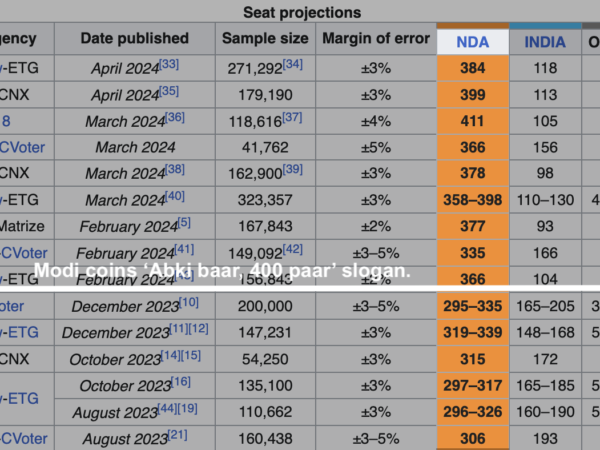
And so these men of Indostan
Disputed loud and long,
Each in his own opinion
Exceeding stiff and strong,
Though each was partly in the right,
And all were in the wrong!
~John Godfrey Saxe (1872)
There’s an interesting backstory to this post. A couple of months ago, I went on a friend-adding spree on Facebook for the first time in my life (I have rarely if at all, sent anyone a friending request before this. I went from around an 800-strong (if I remember correctly) organically grown network to almost 2,800 ‘friends’ in a week’s time. Of course, that meant loosening whatever standards I had set and accepting everyone’s request, as well as sending anyone with more than a few mutuals a request myself in the hope that they’d accept. In the process, I gathered much chaff, but with it, some brilliant grain too. Indeed, as I have often said, serendipity is my Fairy Godmother; I rarely have to do anything purposely to get something disproportionately back (both good and bad, which, I must say, goes with the turf).
One of them is a person I started chatting with on Messenger first and then, like I prefer to do (and most of my friends do, too), shifted to WhatsApp. I do not know what it is or was about the way they came across to me, but I felt a kind of bond, a kinship across the ether, a beautiful and empathetic soul I could speak to, and now exchange (it’s lopsided because I send more than I receive, but yes, there is 2-way traffic, so ‘exchange’ is a fair description) numerous voice notes through the day about stuff we feel and wish to express but is too complicated or long-winded to write about. Indeed, it won’t be wrong to state that I seem to ‘voice’ my opinion to this now-dear friend first before expressing it here, like a kind of one-sided sounding board since most of my notes are me speaking into the void (for they only respond once in a few hours or so, sometimes a day) and thinking aloud stuff I then polish and present in writing elsewhere.
Why am I telling you this? Because yesterday, I realised that there is so much more to them than what they exhibit on social media, and it got me thinking about how little we know about someone who we only know what they tell us about them on public fora, how much we presume about them based on that minuscule amount of data, and allow that presumption to inform and colour our perspective and as a result, our behaviour towards them, without taking into consideration that perhaps what we see is only the tip of the iceberg and that there is a whole living, breathing person of flesh & blood, with their own ideas, thoughts, emotions, justifications, experiences, baggage, history, reasoning, relationships, education, reading, and so on, who we have no more access to than a single ‘blind man of Indostan’ groping the proverbial elephant have to the animal’s actual form.
Let us consider this. Imagine a friend you are connected to on Facebook:
- They live a full life. Let us give it a numerical representation, say 100.
- They have good and bad experiences. Let us presume that these are equally numerous for the sake of argument. So, 50 good and 50 bad.
- They perceive themselves as averagely lucky, with a slight predisposition to bad luck, just like most people do (not me, but I shall come to myself later). So, the 50-50 ratio is seen as a 40-60 or even a 30-70 ratio of good-to-bad things happening to their lives. Let us presume 35 good to 65 bad, for argument’s sake.
- Of the 35 good luck they think they have, they see a small percentage, say 10-15% of it, as something unusual and hence, worth talking about or discussing. That would be about 4 to 5.
- Now, given the limitations of our time, we cannot write about everything we wish talk about. So, we pick and choose what we share on one platform and what we share on another, what we tell our friends and what we reserve for our families, what we announce to the public and what we want to enjoy only with an intimate partner. Let us say that what they share on social media is about 50% of that 4 or 5, which is around 2 to 3.
- Of this 2 or 3 that they share on the social media platform you are connected to them on, you read only a small fraction of, because obviously, you too have other posts to read, other places to be, other things to do, and a life to lead. So, you end up reading less than even 1. Of the 100 that their life is originally.
- And then, you build around that, in your mind, the rest of their personalities, likes & dislikes, beliefs, philosophies, ideologies, thought processes, perspectives, and opinions from extrapolation of that 1 that you see. To repeat: Of the 100 that their life is originally.
- You idolise or vilify them based on this image that you now have built inside of your heads. Interestingly, they are not aware of this. Until one day, you unload on them. And then, they are confused. Why is everyone attacking me, they ask. And once they are out of that crisis and regular programming resumes, they find some of their friends saying something equally stupid or silly, and without any thought or realisation that this is literally less than 1% of their life, that this happened to them too, they attack them. The cycle continues.
This, of course, does not apply to a few people, notably (and the only person I can speak of with some authority) to me. If my life is 100, over 90 of that is online. With me, you truly get what you see. That is, to clarify, not necessarily a feature. Or even a bug. That is simply how it is. I am a diarist. And I write for myself. I write for posterity. I write so I can leave something behind for my progeny. I write as therapy. To me, writing is cathartic. So, most of what happens to me ends up being available to the public online.
But this post is not about people like me. It is about the millions of others, no, strike that, for you do not know or interact with millions, dozens of others you know and judge, that you have built an opinion and image of, that you think you really know, but in reality, don’t.
You see, we seem to take the best that we have, or claim to be, or believe in, and then compare it with the worst that we can interpret someone else’s thoughts or words or actions to base our judgement of their entire persona on.
And social media’s algorithms that are designed to create echo chambers have, over years and years of tuning, subconsciously (to us) honed this instinct (that exists already in our baser animal brains) and aggravated and accentuated its impact in our reaction to what we see, hear, and read. What would have, in pre-social media times, fizzled out because of lack of traction, now reaches threshold critical mass quickly because of the high speed of movement of information through the billions of interconnected people around the world. It is like we have been handed over the keys to a nuclear bomb-making facility, and we are pressing buttons with abandon without realising its consequences on our world.
So, here’s my friendly advice: The next time you want to react to something someone you think you know said, and that reaction you are having viscerally seems to be poisonous, wait, take your hands off the keyboard, sit back, breathe, get up if you wish, grab a tall, cold glass of water (or a stubby, hot mug of tea, for that matter; it’s irrelevant), and ask yourself if from the data you have on that person, can you truly claim to know them? Is your reaction, which should be correctly targeted to what they have said, expressed, or articulated, overreaching into the personal by colouring your judgment about the person themselves? Are you sure what you feel about their thoughts isn’t colouring what you feel about their entire being, their entire life, their entire identity, their whole personality, which you know scant of? And once you have thought, sit back down, remove the person from the frame of reference, and write purely about the idea and the thought they have expressed.
It will, for sure, affect the person concerned. But more importantly, it will free you. Try it. And once you achieve that level of zen in your life, tell me how you did it.
By the way, this has proven to be true almost every single time I have met my online friends in real life. I have found them, without exception, to be kind, generous, empathetic, forgiving, humane, and generally splendid samples of humanity. Try this too. You can thank me later.















![Mr Baba: 'Would you like to take off the backpack now that you've been downstairs for like 30 minutes?'
Ms Kym-Kym: 'I like it like this. You should try it. It's very comfortable.'
Mr Baba: [Pulling on his backpack] 'Hmmm, you're right. That's rather snug.'
Ms Kym-Kym: 'Twinning! Yay!'
#LuckiestManAlive #BearFamily](https://scontent-lax3-1.cdninstagram.com/v/t51.29350-15/416920031_3373151642830342_6696851954454537274_n.webp?stp=dst-jpg&_nc_cat=105&ccb=1-7&_nc_sid=18de74&_nc_ohc=ZMLmjPdSAEUAX8nnJex&_nc_ht=scontent-lax3-1.cdninstagram.com&edm=ANo9K5cEAAAA&oh=00_AfB0olvUVmnenPKd2wCllMDehg5gzDgAbc4BDsGLqIm6pA&oe=65BA4561)

![Kym: 'Mr Baba, can I tell you something wierd? You can actually get tired from doing nothing!!'
Me: 'It is called boredom.'
Kym: 'Noooo. I mean, like physically tired.'
Me: 'One can get tired and sleepy due to boredom. I remember reading about it somewhere. Let's find out.'
[Some Googling later]
Me: 'It says here that "A new paper published in the journal Nature Communications finds that a part of the brain that is associated with motivation and pleasure - the nucleus accumbens - also can produce sleep. The new findings may explain why we have the tendency to fall asleep in the absence of motivating stimuli, i.e., when bored." Isnt it interesting?'
Kym: 'I already knew that. Why do you need to research things we already know?'
Me: [Finding a subject worth talking about now]: ' Ah well, that's what we'll talk of tomorrow on your morning run. It's very interesting the way science is done and our understanding of the universe is expanded.'
Kym: 'Can we talk of unicorns instead?'
Me: 'Sure. How do you know they exist? That's an interesting question too that you can use the scientific method to answer.'
Kym: 'Do they have to exist for us to talk about them? We can just pretend they do for an hour and have fun.'
Me: [Laughing] 'Yes, sure. We can do that too.'
#BabaBabyConversations #BearFamily #KymAndI](https://scontent-lax3-1.cdninstagram.com/v/t51.29350-15/416410840_383105434396466_2267910263456009774_n.webp?stp=dst-jpg&_nc_cat=104&ccb=1-7&_nc_sid=18de74&_nc_ohc=LIozs445JFcAX_48wGC&_nc_ht=scontent-lax3-1.cdninstagram.com&edm=ANo9K5cEAAAA&oh=00_AfDQ2qbb0yO_wUmLj_L0ZxF61eDdwlIN-vyrd8GZe_pBMQ&oe=65BAFA57)










